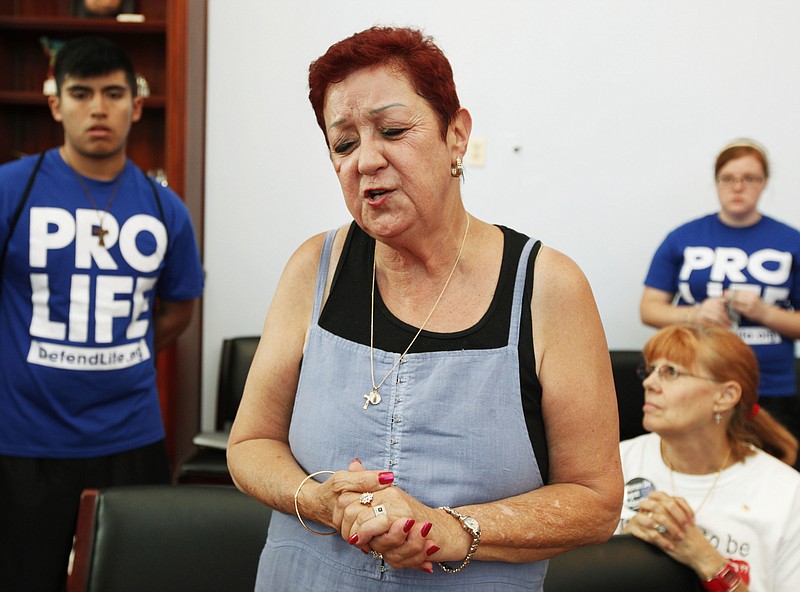The most important aspect of Norma McCorvey's life was never going to be the most consequential.
As the initially reluctant plaintiff in the Roe v. Wade Supreme Court decision that conflated the right to privacy found in the Constitution with a right for women to abort a child, the Texas woman - who died at age 69 Saturday - later called her work to help make abortion legal the "biggest mistake" in my life.
McCorvey's change of heart occurred after she became a born-again Christian, but that part of her story was always going to be buried by those who believed the decision liberated women. The Washington Post, for instance, first made a vague reference to her reevaluation in the seventh paragraph of her obituary, and the New York Times made a similar nonspecific reference to it in the fourth paragraph of its recounting of her life.
Years after the 1973 court decision, the Louisiana native outed herself as "Jane Roe" and began to work in the pro-abortion movement. Celebrated by women who were delighted to have a legal "out" for their risky sexual behavior, she even took a job at a Dallas abortion clinic.
That's where the doubts began to creep in. McCorvey saw abortion being used for birth control, a charge critics had predicted after the Supreme Court decision. She also took in the lack of professional counseling for those women who were ambivalent about whether they really wanted an abortion, a decision many thousands of women then and now regret after the fact.
In time, she began to talk to the national president of the anti-abortion group Operation Rescue, a man she had previously ridiculed. Eventually, she quit her job at the abortion clinic, was baptized by the anti-abortion group leader and joined Operation Rescue.
"I am dedicated to spending the rest of my life undoing the law that bears my name," she told a Senate panel in 1998. "I would like nothing more than to have this law overturned."
By that time, abortions were on the wane because women were recognizing the horror of ending a human life, were seeing the earlier and earlier viability of children, and were increasingly using abortion drugs.
Ironically, McCorvey never aborted the child that caused her to sign on to the case that made abortion legal. Although she had wanted to, Texas laws at the time prevented her from doing so. The child, a girl, was born in 1970 and adopted, as her second child had been. Her first was raised by McCorvey's mother.
After agreeing to become "Roe" - though she claimed she did not read the affidavit - in what became a class-action suit, she was told she would not have to give a deposition or appear in court. Indeed, she heard about the Supreme Court decision by reading about it in the newspaper. Nevertheless, even before she regretted becoming the plaintiff, she said the decision didn't do her any good.
For many years, McCorvey told all who would listen that she had become pregnant with her third child as the result of a rape. She later recanted that charge, saying - years before her conversion to Christianity - she had become pregnant during a relationship in Dallas "through what I thought was love."
She also described - to the New York Times in 1994 - how she believed she was used by one of her attorneys, Sarah Weddington.
"Sarah sat right across the table from me at Columbo's pizza parlor, and I didn't know until two years ago that she had had an abortion herself," McCorvey said. "When I told her then how desperately I needed one, she could have told me where to go for it. But she wouldn't because she needed me to be pregnant for her case.
"Sarah saw these cuts on my wrists, my swollen eyes from crying," she said, "the miserable person sitting across from her, and she knew she had a patsy. She knew I wouldn't go outside of the realm of her and Linda (Coffee, the other attorney in her original case against Texas). I was too scared. It was one of the most hideous times of my life."
McCorvey's conversion to the pro-life movement never sat well with the other side, despite an estimated 58 million legal abortions having been performed. To denigrate her, they made comments about her "ignorance" and her just wanting attention.
Undaunted, she joined the Catholic Church, participated in anti-abortion rallies, petitioned the high court to overturn Roe v. Wade, and was arrested for disrupting the Senate confirmation hearings on strong abortion supporter Sonia Sotomayer to the Supreme Court in 2009.
McCorvey, a ninth-grade dropout, didn't have much of a life growing up, with an abandoned father, a mother who beat her and a marriage at 16, and later drug abuse, alcoholism and attempted suicide. But, courageously, she ultimately saw through the fog of being misused by a national movement and to the importance of every life - and the need to preserve it.
